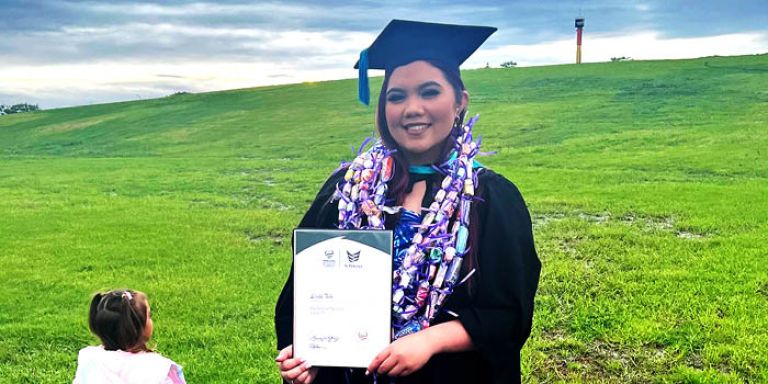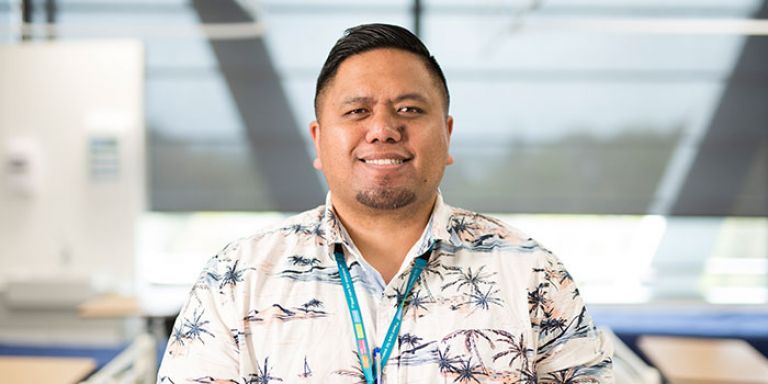Programme highlights
Become a registered nurse with unique skills to support and enhance Pacific health.
This programme has a strong emphasis on cultural-identity and connections to Pacific and nursing world-views. Pacific ways of knowing and learning are woven throughout this programme giving you the practical healthcare skills and hands-on clinical experience to work within your community.
Smaller class sizes encourage a sense of family, aiga (Samoan), kopu tangata (Cook Islands), kāinga (Tongan), magafaoa (Niuean), matavuvale (Fijian) and kāiga (Tokelau, Tuvalu) and contributes to life-long connections.
Pacific leaders, communities and organisations work collaboratively with MIT to enable you to form relationships with those in the health sector.
When you graduate, you’ll be ready to sit the Nursing Council of New Zealand State Examination and apply for registration as a registered nurse in New Zealand.
For FAQ’s specific to the BNP, please click here.
If you are Māori or Pasifika, find out how you could be supported on your MIT journey with Te Ara Oranga.
Please note: Vaccination for COVID-19 is no longer an expectation for workers (including student nurses) in the public health system. Health NZ published a notice on 19 December 2024 stating the Pre-employment COVID-19 Vaccination Policy is withdrawn. This means that while getting vaccinated for COVID-19 is still highly recommended, it won’t be expected of student nurses. Students in nursing programmes at MIT will no longer be required to be vaccinated for COVID-19 or provide proof of vaccination to MIT. Other immunisation requirements are still in place (please see your programme information for details). To protect yourself and others, it is important to stay up to date with the latest COVID-19 vaccines as the virus changes, follow the latest immunisation recommendations, and be aware of any new infectious disease risks in your area.
Entry requirements
All enrolments in the Bachelor of Nursing Pacific programme are encouraged to attend an information session. All applicants must complete a Health Declaration and the New Zealand Nursing Council requires criminal convictions to be declared. In accordance with the Vulnerable Children Act (2014), the School of Nursing will perform safety checks on all students.
Applicants must meet the following entry requirements:
University Entrance
- NCEA Level 3
- Three subjects – at Level 3 or above, made up of:
- 14 credits each, in three approved subjects.
- Literacy – 10 credits at Level 2 or above, made up of:
- 5 credits in reading
- 5 credits in writing
- Numeracy – 10 credits at Level 1 or above, made up of:
- Achievement standards – specified achievement standards available through a range of subjects; or
- Unit standards – package of three numeracy unit standards (26623, 26626, 26627 – all three required); and
- Three subjects – at Level 3 or above, made up of:
- A minimum of 12 credits at NQF Level 2 or higher from the subjects listed below:
- Biology
- Chemistry
- Physics
- Science
OR
- NCEA Level 2
- Applicants must hold at least 80 credits at NCEA Level 2, of which 40 credits must be at merit or excellence. Of the 80 NCEA Level 2 credits, students must have gained a minimum of 5 credits in reading and 5 credits in writing in English or Te Reo Māori; and
- A minimum of 12 credits from the subjects listed below:
- Biology
- Chemistry
- Physics
- Science; and
- A minimum of 10 credits at Level 1 or higher in mathematics.
OR
Applicants who have completed the New Zealand Certificate in Career and Study Preparation (Level 4), with a health-related contextualisation, will be offered a place in the BNP programme, subject to referee reports and available places.
OR
Applicants must be able to demonstrate a mature approach to study; ability to pass a science diagnostic test; the ability to manage their time; ability to seek support; a strong motivation to work in the Health Sector; the ability to read and write at the level required for degree-level study. The above attributes will be assessed through information session.
AND
Have English language competence to undertake this programme, which is taught and assessed in English. Any applicants whose first language is not English will be required to provide evidence of an overall IELTS score of 6.5 with not less than 6.5 in each, or in exceptional circumstances a pass in another equivalent test of English. IELTS and OET will be accepted. Nursing Council no longer accepts PTE.
Equivalence will be considered by a case-by-case basis demonstrated by evidence of having completed 3 years of secondary education, or tertiary study in New Zealand at a diploma or degree level.
General requirements
- Each applicant is required to submit the names of at least two referees who are able to affirm that the applicant is of good character and reputation and is likely to be a ‘fit and proper’ person to register as a Registered Nurse. Relatives may not be used as referees. Referees must have known the applicant for at least two years.
- The applicant’s level of health shall be such that it is possible to achieve the competencies required for the registration as a nurse. A health declaration is required and further reports may be requested with the consent of the applicant. Immune status must be provided for the specified diseases/conditions as determined by the School from time to time.
- Applicants are required to declare all criminal or pending criminal convictions with enrolment. Police screening is required for all applicants. In cases where a previous criminal conviction has been reported, applicants will be interviewed by the Director of Nursing of School and their prospects of gaining registration upon successful completion of the programme will be outlined.
English language entry requirements
Applicants must have sufficient competence in the English language to undertake this programme, which is taught and assessed in English.
Any applicants whose first language is not English may be required to provide evidence of an overall IELTS score of 6.5 with not less than 6.5 in each, or in exceptional circumstances a pass in another equivalent test of English. Please note the Nursing Council no longer accepts PTE.
English language requirements for international students
International students are required to meet the minimum English language requirements for this level programme as detailed on the NZQA website.
Any applicants whose first language is not English may be required to provide evidence of an overall IELTS score of 6.5 with not less than 6.5 in each, or in exceptional circumstances a pass in another equivalent test of English. Please note the Nursing Council no longer accepts PTE.
Exceptions
Applicants who have not attained the age of 20 years and do not hold the required minimum entry requirements may be eligible to be enrolled in exceptional circumstances. Such decisions will be made by the appropriate Director of Nursing and will be determined on a case-by-case basis.
Give yourself credit with Recognition of Prior Learning (RPL)
Did you know you can use the knowledge and experience you already have to your advantage?
Your previous work experience and on-the-job skills, volunteering, professional development, and other providers’ qualifications can be recognised as prior learning, matched against credits in our courses, and put towards your qualification – potentially saving you money and possibly helping you to complete your qualification faster Learn more.
Programme structure
You will need to complete the below 13 courses (360 credits):
Level 5
Level 6
Level 7
Do you want to study a single course, without enrolling into the full programme?
Courses within some of our programmes may be offered as an individual Certificate of Proficiency (COP). Programme entry requirements and course fees apply. For more information, please speak to our friendly Ask Me! team.
Career opportunities
A broad range of career options as a registered nurse with specialised skills in Pacific health care. For potential salaries visit careers.govt.nz.

















